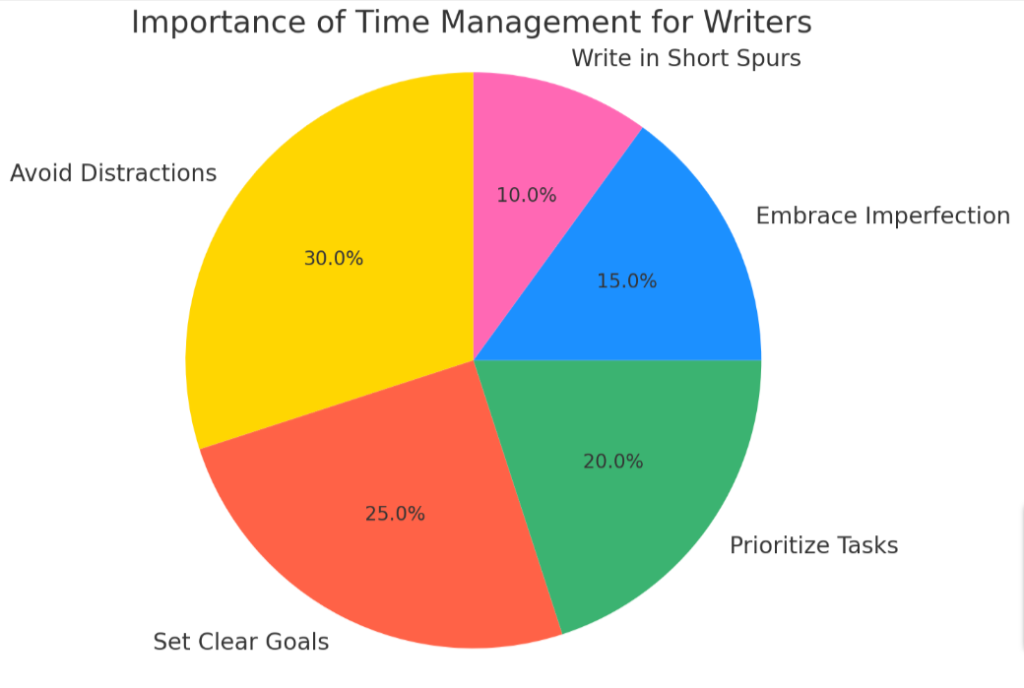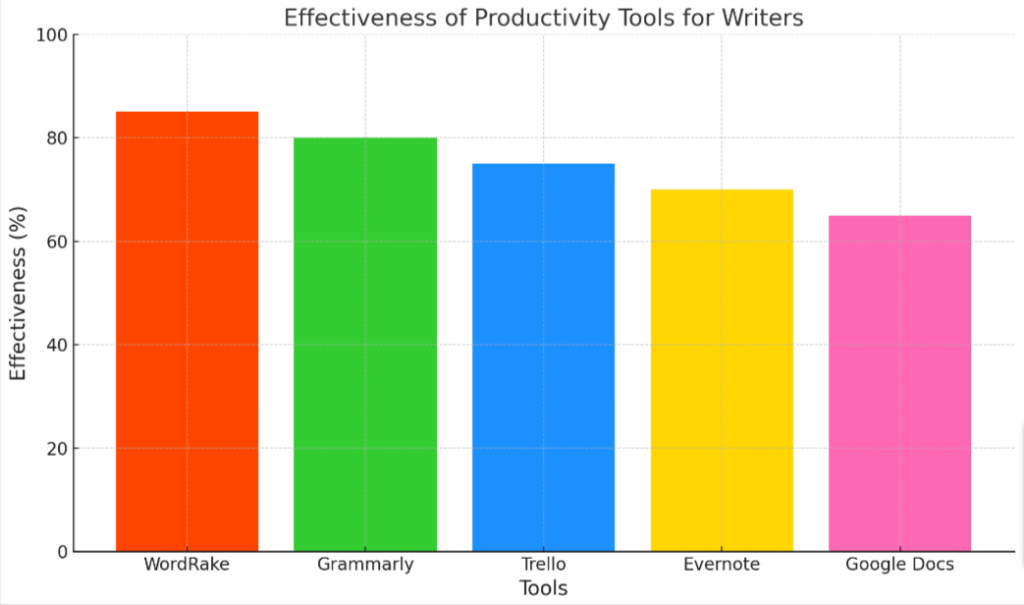Mastering the Clock: Productivity Secrets for Writers
Struggling to find time for writing amidst the chaos of everyday life? You’re not alone, as most writers grapple with balancing their creative process with daily responsibilities. This blog post is packed with practical hacks to help you manage your time better, write more efficiently and overcome common hindrances like distractions and procrastination.
Ready to jumpstart your productivity? Let’s dive in!
Key Takeaways
- Avoid distractions by turning off notifications, creating a dedicated workspace, and setting focused work time.
- Set clear goals to maintain productivity and steer your writing efforts in a definite direction.
- Prioritize tasks using strategies like making lists or employing the Eisenhower Matrix.
- Embrace imperfection and focus on progress instead of perfection.
- Write in short spurts with focused intensity and take regular breaks to prevent burnout.
Importance of Time Management for Writers
Time management is crucial for writers because it helps them avoid distractions, set clear goals, prioritize tasks, embrace imperfection, and write in short spurts.
Avoiding distractions
Keeping distractions at bay is vital for productive writing. In today’s tech-heavy world, countless notifications can pull your focus from the task at hand. The simplest way to tackle this issue is by turning off these potential disruptors, whether that means putting your phone on silent mode or closing all irrelevant tabs on your computer browser.
Creating a dedicated and organized workspace can also contribute significantly to reducing distractions. This could be as simple as clearing clutter from your desk or as involved as setting up a home office separate from common living areas.
Additionally, you may benefit from incorporating specific periods of focused work time into your schedule, where you dedicate yourself entirely to writing without interruption.
Setting clear goals
Busy writers often grapple with countless ideas, tasks, and deadlines. Setting clear goals can serve as a beacon of focus amidst the chaos. This time management hack is crucial to maintain productivity and steer their writing efforts in a definite direction.
A well-defined goal provides motivation, offering writers an achievable target or endpoint. It transforms the abstract concept of ‘writing’ into tangible objectives such as hitting a certain word count within a timeframe or completing chapters by specific dates.
A distinct goal also fuels efficiency since busy writers understand exactly what they are striving to accomplish and can plan accordingly.
Prioritizing tasks
Proper prioritization of tasks amplifies writing productivity and aids in efficient time management for busy writers. This approach helps to distinguish which tasks are more important at each moment, enabling you to focus on high-priority items first.
The benefit lies in accomplishing key tasks that contribute most significantly towards your writing goals. Strategies may include making a list, setting clear deadlines, or employing techniques like the Eisenhower Matrix to determine urgency and importance of each task.
By using these strategies effectively, you can reduce stress levels while managing multiple writing projects with ease and efficiency, thereby maximizing your writing time.
Embracing imperfection
Embracing imperfection can be a powerful way for busy writers to improve their time management. Instead of striving for perfection in every writing task, writers can acknowledge that not everything will be flawless and focus on progress instead.
By accepting that mistakes are inevitable, writers can let go of the pressure to produce flawless work and instead use their time more efficiently. Embracing imperfection allows writers to prioritize tasks, move forward with their projects, and find satisfaction in the continuous process of improvement.
Writing in short spurts
To boost productivity and manage time effectively as a busy writer, try writing in short spurts. Instead of forcing yourself to sit down for hours on end, break up your writing sessions into shorter increments.
Set a timer for 25 or 30 minutes and write with focused intensity during that time. Taking regular short breaks between these bursts of concentrated work can help prevent burnout and keep your mind fresh.
By working in shorter intervals, you’ll find it easier to stay motivated and maintain high levels of productivity throughout the day.

Tips for Improving Time Management for Writers
Incorporate work downtime for writing, batch similar activities together, say no more often, delegate tasks when possible, and understand and accept limitations.
Incorporate work downtime for writing
Find pockets of time within your workday where you can squeeze in some writing. It could be during your lunch break, while waiting for a meeting to start, or even during your commute if you take public transportation.
By utilizing these small windows of downtime, you’ll be able to make progress on your writing projects without sacrificing other important tasks. Make sure to have a notebook or a notes app handy so that whenever inspiration strikes, you can quickly jot down ideas and thoughts.
Incorporating work downtime for writing allows you to maximize your productivity and make the most of the time available to you.
Batch similar activities together
Batching similar activities together can significantly improve your time management as a writer. By grouping tasks that require similar skills or resources, you can streamline your workflow and minimize the time wasted on transitioning between different types of work. Here are some examples of how you can apply this strategy to maximize your productivity:
- Research and note-taking: Instead of conducting research for each individual writing project separately, set aside dedicated blocks of time to gather information and take notes. This way, you can immerse yourself in the topic at hand without constantly switching gears.
- Writing and editing: Rather than trying to write and edit simultaneously, allocate specific periods for each activity. Focus on generating ideas and getting your thoughts down during one session, and reserve another session exclusively for revising and polishing your work.
- Social media engagement: If you use social media platforms to connect with readers or promote your writing, batch the time spent on these platforms. Dedicate a set amount of time each day or week to engage with followers, respond to comments, and share your content. By doing so, you avoid getting caught in an endless scroll when it’s essential to focus on writing.
- Administrative tasks: Whether it’s managing emails, tracking expenses, or organizing documents, administrative tasks can consume valuable writing time. Set aside specific blocks of time to tackle these tasks efficiently instead of handling them sporadically throughout the day.
- Creative brainstorming: If you’re working on multiple writing projects simultaneously or have numerous ideas bubbling in your mind, designate separate brainstorming sessions for each one. This allows you to give undivided attention to generating fresh ideas without feeling overwhelmed by juggling multiple concepts at once.
Learn to say no
One important tip for improving time management as a writer is to learn to say no. As writers, we often have multiple demands on our time, such as meetings, social events, and requests for help from others.
While it can be difficult to turn down these opportunities, saying no allows us to prioritize our writing and focus on the tasks that are most important. By setting boundaries and learning to say no when necessary, we can better manage our time and dedicate more hours to our writing projects.
This not only helps us stay focused but also ensures that we meet our deadlines and achieve our writing goals efficiently and effectively.
Delegate tasks when possible
Delegate tasks when possible to improve your time management as a busy writer. Identifying the activities that can be handed off to others allows you to focus on what’s most important – writing.
Whether it’s administrative tasks, research, or editing, assigning these responsibilities to someone else not only frees up your time but also ensures that you can stay focused on creating quality content.
Delegating tasks not only helps streamline your workflow but also allows you to make the most of your limited time and energy as a writer. So don’t hesitate to ask for help when needed and lighten your workload through delegation.
Understand and accept limitations
To effectively manage time as a writer, it is crucial to understand and accept your limitations. Recognize that you have a finite amount of time in a day and there are only so many tasks you can accomplish.
Don’t put unnecessary pressure on yourself to do it all. Instead, prioritize your most important writing projects and focus on those first. By acknowledging your limitations, you can set realistic goals and ensure that you allocate your time wisely to the tasks that matter most to you as a writer.
Embrace the fact that it’s okay to say no to certain commitments or delegate tasks when possible, allowing yourself the space and mental energy needed for your writing endeavors.
Practical Strategies for Managing Time as a Writer
Limit distractions by turning off notifications on your smartphone, checking email less frequently, and creating a dedicated writing schedule to ensure uninterrupted focus.
Limiting distractions
To maximize your writing time, it’s crucial to limit distractions. Find a quiet and comfortable space where you can focus without interruptions. Turn off notifications on your smartphone or consider changing the settings to minimize distractions.
Check your email less frequently, saving valuable time for writing instead. Establish a consistent writing schedule that works for you and stick to it. By minimizing distractions, you’ll be able to fully immerse yourself in your work and increase your productivity as a writer.
Changing smartphone notification settings
Changing smartphone notification settings can greatly improve time management for busy writers. Here are some tips to help you make the most of your writing time:
- Customize your notification settings to minimize distractions.
- Turn off unnecessary notifications from social media apps.
- Set your phone to silent or vibrate mode while you’re working on your writing projects.
- Use the “Do Not Disturb” feature on your phone during specific writing periods.
- Disable push notifications for email and other messaging apps.
- Prioritize important calls and messages by creating custom alerts.
Checking email less frequently
To improve your time management as a writer, try checking email less frequently. Here are some tips to help you minimize distractions and stay focused on your writing:
- Set specific times for checking and responding to emails.
- Turn off email notifications on your devices.
- Use an email management system to filter and organize your messages.
- Prioritize urgent emails and respond to them first.
- Create folders or labels to categorize emails for easy reference later.
- Unsubscribe from unnecessary mailing lists or newsletters that clutter your inbox.
Setting writing schedules
Setting writing schedules is an effective way for busy writers to manage their time and improve their productivity. Here are some tips for setting writing schedules:
- Allocate specific blocks of time for writing each day.
- Plan your writing sessions in advance, so you have a clear idea of when you will be working.
- Find a quiet and comfortable place to write, free from distractions.
- Set realistic goals for each writing session, whether it’s completing a certain number of words or finishing a section of your work.
- Use a timer or app to track your writing sessions and keep yourself accountable.
- Experiment with different times of the day to find when you are most productive and focused.
- Be consistent with your schedule to establish a routine and make writing a regular habit.
Utilizing productivity tools like WordRake
When it comes to managing your time as a writer, utilizing productivity tools such as WordRake can be incredibly beneficial.
| Benefits | Description |
|---|---|
| Efficiency | WordRake helps check your work for clarity and brevity, eliminating the need for multiple rounds of editing and saving you time. |
| Consistency | The tool ensures style and tonal consistency across your body of work, saving you time spent on re-reading and editing. |
| Grammar and Punctuation | WordRake checks your writing for grammar and punctuation errors, which can otherwise consume a lot of time while proofreading. |
| Time Tracking | The tool can help you track the time you spend on each piece, enabling you to better manage your writing schedule. |
Incorporating WordRake into your writing process can streamline your workflow, boost productivity, and ultimately save you time.

Conclusion
Incorporating effective time management hacks can greatly benefit busy writers. By avoiding distractions, setting clear goals, prioritizing tasks, and embracing imperfection, writers can maximize their productivity.
Additionally, incorporating practical strategies such as limiting distractions, changing smartphone notification settings, checking email less frequently, and utilizing productivity tools can further enhance time management for writers.
With these tips and techniques in place, busy writers can stay focused and efficient in their writing endeavors.

